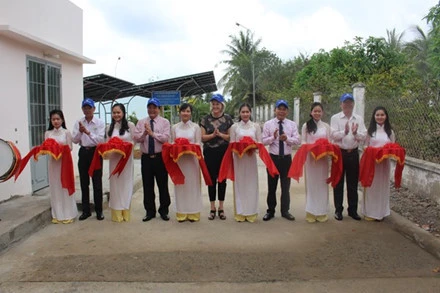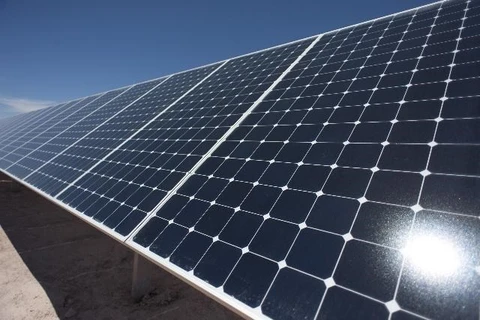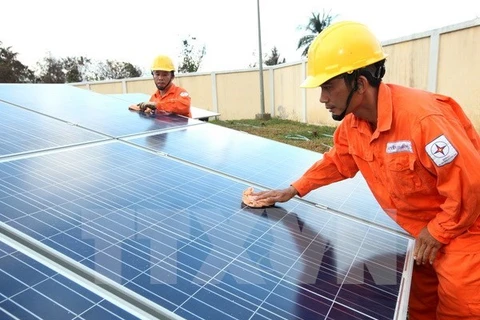Hanoi (VNA) - Investors have been looking for a synchronous policy to address difficulties faced in solar power projects in Vietnam.
Chairman of Son Ha Group Le Vinh Son said that investors were interested in solar power projects in Vietnam but faced difficulties because of non-synchronous policies.
The difficulties included few legal frameworks, mechanisms and human resource for the production and application of renewable energy, he said.
Solar power projects usually required huge investment, resulting in high power costs which made solar power less competitive than other power types, he said.
Son said that solar power projects were costly but investors found it difficult to get loans, even preferential loans which are designed to encourage science and technology projects.
Chairman and General Director of Red Sun Energy Joint Stocks Company Diep Bao Canh said that so far, few credit institutions or banks had schemes to develop human resources for assessing and approving credit to solar power projects.
Dr Nguyen Huy Hoach from the Vietnam Clean Energy Association said that Vietnam had great potential for solar energy, particularly in the Central Highlands region and south central provinces with an average 2,000-2,600 hours of sunlight each year.
It has average solar irradiance of 4-5 kWh/squ.m/day, which is comparable to Thailand and the Philippines, which have more developed solar markets in the region.
However, in Vietnam, solar energy was little used, just for households, water-boiling system, lighting and drying, he said.
Tang The Hung, vice head of Planning Division under General Directorate of Energy, said so far Vietnam had no commercial solar power generating project despite the country wanting to increase solar power productivity from a few MW now to 850MW in 2020 and 4,000 MW in 2025.
Hung said that two months ago, the Ministry of Industry and Trade submitted a proposal on solar power price to the Prime Minister.
Under the proposal, the Government would subsidise 3,150 VND (15 USD cents) per kWh to rooftop solar power projects. To other on-grid solar power projects, each kWh would be paid 2,352 VND (11.2 USD cents). The projects must have solar cells with efficiency higher than 16 percent and productivity of less than 100 MW.
Until now, about 4MW of solar power is used in Vietnam with few systems including the 200kWp system of Intel in the HCM City Hi-tech Zone, a 140 kWp system in Tan Tao Industrial Zone and a 212 kWP system on the rooftop parking area of Big C supermarket in southern Binh Duong Province.
Previously, the ministry proposed Electricity of Vietnam (EVN) buy solar power at 11.2 cent per kWh but investors said the price was too low, being lower than the price that the EVN buys electricity from small hydro power plants during rush hours – 12.38 cent.
The United Nations Development Programme, in its report in May, 2016, suggested regulating a “Feed-in-Tariff” of 15 USD cents/ kWh for mainland solar photovoltaic (PV) power plants, and 19 USD cents/ kWh for power plants on islands, over a period of 20 years.
The organisation also recommended financial support for-grid and off-grid solar PV systems in remote areas and islands as well as incentives to reduce investment costs of solar PV power plants, “rooftop” and community solar PV systems.
Dr Duong Duy Hoat from the Institute of Energy Science said a law on renewable energy is needed to ensure sustainable development of renewable energy.
The Government needs to instruct ministries, sectors and localities to plan for developing renewable energy on the basis of forecasts of demand and supply.
Developing national criteria and regulations on renewable energy is also necessary, Hoat said, adding that a fund should be established to ensure financial resources for renewable energy research and development.
Incentives should be offered to encourage international and domestic enterprises to participate in the sector, while promoting communications to raise public awareness of value of renewable energy in sustainable development, according to Hoat.
The revised Vietnam Power Development Planning in 2011-2020 with an outlook to 2030, approved by the Prime Minister in March, 2016, has given priority to developing renewable energy sources, step by step raising the share of renewable energy in national electricity output to 7 percent in 2020 and over 10 percent by 2030.
Total hydropower capacity is expected to reach 21,600 MW by 2020 from the current 17,000 MW, and to 24,600 MW and 27,800 MW by 2025 and 2030, respectively. The hydropower output will account for 29.5 percent, 20.5 percent and 15.5 percent of total electricity generation in 2020, 2025 and 2030, respectively.
The planning also aims to raise wind energy capacity from 140 MW now to 800 MW by 2020, accounting for 0.8 percent of total electricity output.-VNA

























